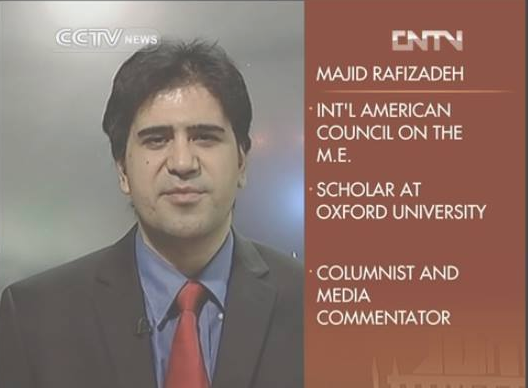Did Iran just violate the Chemical Weapons Convention?
Dr. Majid Rafizadeh/ArabNews/April 10/17
Both Iran and Syria are signatories of the international treaty, the Chemical Weapons Convention. The use of chemical and biological weapons in war was banned after World War I through the 1925 Geneva Protocol. Subsequently the Chemical Weapons treaty went into effect in 1997.
International attention has been directed toward the Syrian government for the use of chemical weapons against innocent people. Nevertheless, the critical role that Assad’s staunchest ally and bedfellow, the Islamic Republic of Iran, has played in these attacks should not be overlooked.
US Secretary of State Rex Tillerson pointed to Iran’s “moral responsibility” in Syria’s chemical weapons attacks. He stated that “while we continue to monitor the terrible situation, it is clear that this is how Bashar Assad operates: With brutal, unabashed barbarism … Those who defend and support him, including Russia and Iran, should have no illusions about Assad or his intentions. Anyone who uses chemical weapons to attack his own people shows a fundamental disregard for human decency and must be held accountable.”
Nevertheless, I would argue that the Islamic Republic appears to bear more than just moral responsibility in the latest chemical weapon attacks. From a legal stand point, there exist robust grounds to legally hold the Iranian government — specifically Iran’s Revolutionary Guard Corps and its elite branch Quds Force, which operate in foreign territories to advance Iran’s revolutionary principles — accountable and responsible.
Iran government’s responsibility
There are two key issues to address. The first is linked to the parameters of the Chemical Weapons Convention, and second is related to the scope of Iran’s involvement in Syria’s war and military actions. It is crucial to point out that Iran does not deny its military involvement in Syria.
The Chemical Weapons Convention prohibits the following:
• Developing, producing, acquiring, stockpiling, or retaining chemical weapons.
• The direct or indirect transfer of chemical weapons.
• Chemical weapons use or military preparation for use.
• Assisting, encouraging, or inducing other states to engage in CWC-prohibited activity.
• The use of riot control agents “as a method of warfare.
It goes without saying that if it was not for Iran’s military, financial, intelligence and advisory assistance to the Syrian government’s apparatuses, Assad’s Alawite state would have not survived.
In addition, it worth noting that Iran’s Quds Force, under the leadership of Qassem Soleimani, has infiltrated Syrian military and security infrastructures in such a manner that it has significant control of Syria’s political establishment. Iran’s military generals make major decisions in Syria battlefields. Iran also hires and deploys proxies as well as Shiite fighters from other countries to fight in Syria. Taking all this hard evidence into account, it is hard to believe that Iran is not involved in every tactical, strategic, and militaristic move that Assad’s forces make.
Iran’s Quds Force, under the leadership of Qassem Soleimani, has infiltrated Syrian military and security infrastructures in such a manner that it has significant control of Syria’s political establishment. it is hard to believe that Iran is not involved in every tactical, strategic and militaristic move that Assad’s forces make.
When it comes to the Chemical Weapons Convention, it prohibits the Syrian government from “developing, producing, acquiring, stockpiling, or retaining chemical weapons.” In the midst of war, it is questionable whether the Syrian government will have the capabilities of producing chemical weapons without the technological and military assistance of it closest ally, Iran. Even if we assume that the Syrian government has the capability of developing its own chemical weapons, it would be impossible for the Syrian government to “stockpile” and “retain” these weapons without assistance from Iran’s military force. Likewise, “direct or indirect transfer” of these chemical weapons would more likely require protection from Iran’s military.
Furthermore, the Chemical Weapons Convention prohibits any state from “assisting, encouraging, or inducing other states to engage in CWC-prohibited activity.” In addition, the Syrian government is not even supposed to possess chemical weapons due to a 2014 agreement as well as the Chemical Weapons Convention. But this is not the first time that chemical weapons have been employed in Syria against innocent children, women, and men. Despite that, Iran has continued to support and encourage Assad by all means.
Tillerson also called upon Russia and Iran to “exercise their influence over the Syrian regime and to guarantee that this sort of horrific attack never happens again.”
But Iran will never use its influence to stop Assad from using these types of brutal military tactics. The major purpose of these attacks is not only to kill people but also to impose tremendous shock and fear among them and the opposition. Since 2011, when Syria’s war erupted, no amount of brutal acts by Assad has stopped the Iranian government from full heartedly supporting Assad’s Alawite state. In fact, Tehran’s financial, military, intelligence and advisory assistance have significantly increased.
Finally, based on the nuances of the Chemical Weapons Convention, there exist robust grounds to hold the Iranian government and leaders accountable for Syria’s Chemical Weapons attacks; and to bring those Iranian leaders and generals to the International Criminal Court (ICC). Many people including Syrian human rights activists have long called on the UN to bring Iran to justice for other crimes and atrocities as well, such as killing of civilians through militias or the IRGC. Nevertheless, no actions have been taken.
Other methods to pressure Iran include to imposing sanctions on the Quds Force and the IRGC, which are publicly and blatantly assisting Assad’s forces in every endeavor.
• Dr. Majid Rafizadeh is a Harvard-educated, Iranian-American political scientist. He is a leading expert on Iran and US foreign policy, a businessman and president of the International American Council. He serves on the boards of the Harvard International Review, the Harvard International Relations Council and the US-Middle East Chamber for Commerce and Business. He can be reached on Twitter @Dr_Rafizadeh.
http://www.arabnews.com/node/1082361#.WOvxf2pxFCk.twitter

















